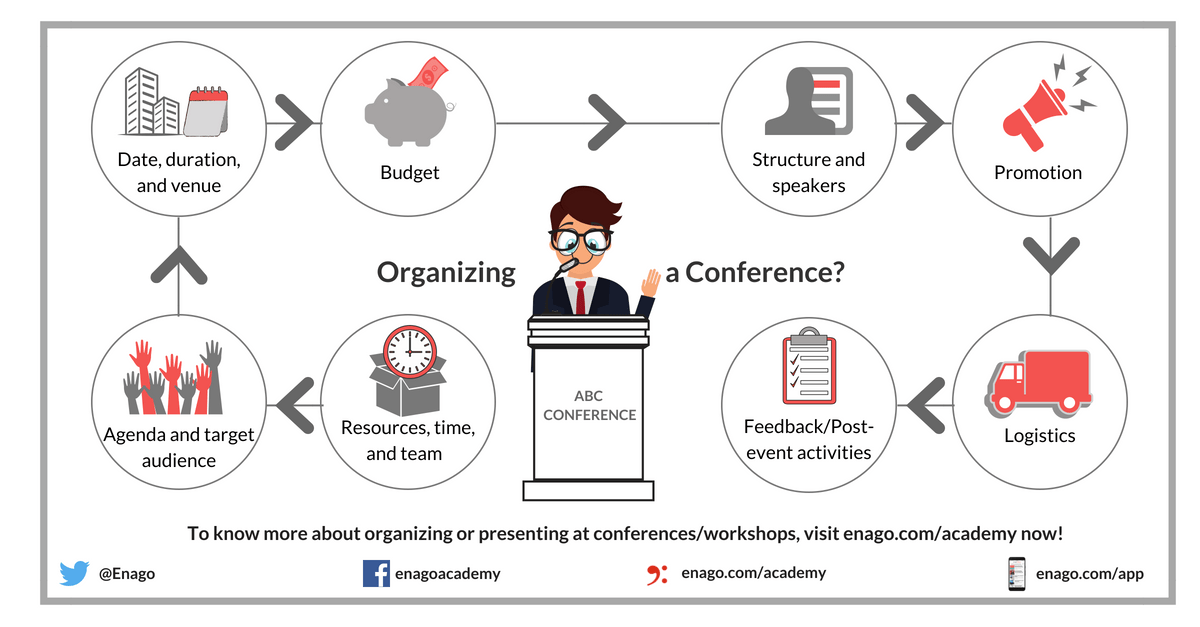How to Organize High-Quality Conferences and Workshops

Have you been asked to organize a conference or workshop? Do not worry; it is a good opportunity for you to network and bring people together for a common purpose. A conference or workshop can be organized to:
- share research
- address a problem
- educate people
- develop policies
Furthermore, as the conference organizer, you will gain administrative experience, expand your network, and learn new things!
Requisites for Planning a Conference or Workshop
Before you agree to take on the task, you need to ask yourself the following questions:
- Do you have the resources?
- Do you have the time?
- Are other people or groups better equipped for this?
- Can the goal of your event be achieved in any another way?
If you decide to proceed, start early. Most organizers recommend you start months or a year before the event.
Organize a Team
You will need a team to help you. Decide how you and your team will communicate regularly. Moreover, draw up a checklist with a reasonable timeline.
Here are some main points to consider with your team to get the process started:
- The goal of your event
- Target audience
- Duration and date
- Overall theme
- Conference structure
- Continuing education credits (if any)
- Exhibitors (if any)
- Visits to relevant program sites (if any)
- Promotional materials
- Registration fee

Create a Budget
Your expenses will vary depending on the nature of your event. Some common items are meals, refreshments, entertainment, venue hire, equipment hire, stationery, accommodation, and transport.
If you need to approach sponsors or apply for grant funding, do it early.
Look for Keynote Speakers
You may want someone of influence to start your event and an equally authoritative person to end it. You should ask speakers well in advance and in some cases offer them compensation. Furthermore, you need to ensure they understand what you expect of them.
Manage Logistics
Once you and your team have worked out the basics mentioned above, you can turn your attention to the details. Keep your participants’ needs in mind to help you decide the following:
- Venue: do you need facilities with accommodation and catering?
- Transport: do participants need to travel?
- Location: will your event be held locally or abroad?
- Conference rooms: number and size of rooms, seating arrangements
- Equipment: whiteboards, flip charts, Wi-Fi, audiovisual or sound equipment
- Contracts: have everything in writing for services such as catering or equipment rentals
- Registration: how will participants register?
- Registration deadline: decide on a date
- Photographs: will the event be photographed? How can participants buy copies?
- Stationery: notebooks, pens, and identification tags
- Entertainment: will there be evening meals with guest speakers, award ceremonies, or social occasions?
- Safety and security: first aid kits?
- Volunteers: direct entry or welcome people on the day
Create a Program
The program should include a description of the event, its aims, key speaker information, sessions, their starting times and titles of presentations. You could use your theme to design a logo and brand all your conference materials.
Plan Promotions
You may need to publicize your conference or workshop to alert potential participants or promote your work. Platforms available for this include:
- Website
- Social media
- Blogs
- Press releases
- Journalists–invite them to attend
Finally, if you receive sponsorship or grant funding, remember to thank the funding agencies and/or sponsors.
Things to Remember on the Day
- Manage timing of the sessions.
- Arrange backup speakers in case your keynote speakers cannot attend.
- Plan for unforeseen problems: someone available to help with issues on the conference day.
Execute Post-Event Activities
After your event, thank everyone for their efforts and participation. Email them an online survey to collect feedback. Most importantly, keep the checklist from this event to help you plan your next one.
There are many resources available to help you plan an event of this nature. If you were given the opportunity to organize a conference or workshop, would you do it and how? Share your thoughts in the comments section below!









